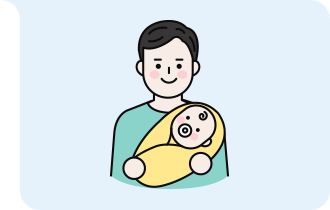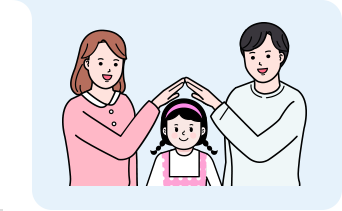Low Fertility
HOME Five Key Tasks Low Fertility
게시판 리스트

key tasks for creating a society in which all
members care for one another and work together
1. We reduce financial burdens of childbirth and rearing!
- Expand child benefits and alleviate child medical expenses
- Remove the maternity allowance blind spot
- Improve the environment for childbirth including support for infertility treatment and expansion of criteria for multi-child family support

Current Progress
Expand eligibility for child benefits (Sept. 2019)
- Provide benefits to all children under age seven
Ultimately realize no medical costs for children up to one year old and cover essential treatment for children (2019)
- Alleviate the financial burden of National Health Insurance for children up to one year old (21–42% → 5–20%)
- Expand National Health Insurance coverage to include congenital metabolic disorders (approx. 50 diseases) and hearing screening tests (2 tests)
Remove maternity allowance blind spot (July 2019)
- Provide parental allowances to working mothers unenrolled in employment insurance (KRW 500,000 monthly, up to KRW 1.5 million for three months)
Improve the pregnancy and childbirth environment (2019)
- Eliminate age restrictions for infertility support (44 and younger) and increase the number of support sessions offered (up to 17 times)
- Enhance support for pregnancy and childbirth medical costs (increase in the subsidy [People’s Happiness Card] KRW 500,000 → KRW 600,000, KRW 900,000 → KRW 1 million for twins or more)
2. We secure more time for parents to spend with their children!
- Promote the working-hour reduction model considering life-cycle stages
- Encourage fathers to use parental leave
- Reform the maternity leave system so that anyone can enjoy it

Current Progress
Extend the period of paternity leave (Oct. 2019)
- Provide 10-day paid paternity leave and allow divided use of leave (one time only)
Extend working hour reduction during the childcare period (Oct. 2019)
- Provide working hour reduction benefits for up to two years including during the period of parental leave use (1–5 hours/day)
Remove maternity allowance blind spot (July 2019)
- Allow workers to use family care leave by the day when they need to care for family members (up to 10 days annually)
Allow concurrent use of parental leave (Oct. 2019)
- Allow parents to concurrently use parental leave for the same child
3. We develop a sophisticated and safe childcare system!
- Raise the number of national and public childcare centers and kindergartens
- Establish an all-day care system for elementary students
- Strengthen home-visit care support, including reforming child caregiver services

Current Progress
Strengthen public childcare
- Expect to achieve a 40% public childcare usage rate ahead of schedule (2022→2021)
- Revise childcare support system, such as distinguishing between basic and extended childcare services and dispatching teachers in extended childcare services (Mar. 2020)
Reinforce public kindergartens
- Expect to achieve a 40% national and public kindergarten usage rate ahead of schedule (‘22→‘21)
- Adopt the “Edufine” program and expand after-school care classes
Expand all-day childcare
- Increase the number of children in all-day care classes for elementary students (school + community) by 200,000 by 2022 <The number of enrolled children rose by about 53,000 compared to the end of 2017 (as of June 2019)>
Support home-visit childcare (2019)
- Improve treatment of caregivers and secure skilled caregivers through integrated management
- Expand government support target(median income below 120%→below 150%) and extend childcare time(600 hours annually→720 hours annually)
4. We create an inclusive family culture respecting all children!
- Reform the irrational legal system, which is discriminative against children
- Reinforce training to eliminate discrimination against single parents and accept multi-cultural families
- Establish conditions for equal treatment of single-parent childbirth and rearing

Current Progress
Systematically reform the unreasonable system for single-parent childbirth and rearing
- Pursue adoption of a birth notification system by which medical organizations notify a government institution of all newborns
Expand child support for single-parent families
- Adult single parents (25 and older): from KRW 130,000 per month (for children under 14)to KRW 200,000 per month (for children 18 and under)
- Adolescent single parents (24 and younger): from KRW 180,000 per month to KRW 350,000 per month
Develop a pregnancy-childbirth counseling system (Aug. 2019)
- Provide 24-hour emergency counseling and introduce appropriate institution services for pregnancy and childbirth crises
Secure the right for learning of adolescent single mothers (Mar. 2019)
- Operate commissioned education institutions for adolescent single mothers nationwide
5. We lay a foundation for the stable lives of the 2040 generation!
- Enhance an equal and stable youth job safety net (cooperation with Presidential Committee on Jobs)
- Reinforce housing support tailored to life-cycle stages of young adults and newlyweds
- Create a child-friendly environment
- Reform the education system to nurture creative children

Current Progress
Supply customized public rental housing for youths and newlyweds
- Supply 32,000 units of buy-to-rent and rent-to-rent housing for youths and newlyweds (2019)
- Complete construction of 15,000 “Haengbok Housing” units which specialized for newlyweds (2019)
Provide opportunities for affordable home ownership
- Prepare legal foundation for housing supply to newlyweds (Shinhon Heemang Town) and supply 936 units in two pilot areas (2018)
- Pursue construction of 7,000 Shinhon Heemang Town units (2019)
Enhance housing cost support for young adults and newlyweds
- Provide support for housing mortgage loans for newlyweds of 80,000 house holds (2019)
- Expand young adult housing financial support such as introducing deposit and rental fee loans only for youths
Create a child-friendly environment
- Build business agreements with relevant ministries on Urban Regeneration New Deal regions and Public Housing areas to create a child-friendly environment



